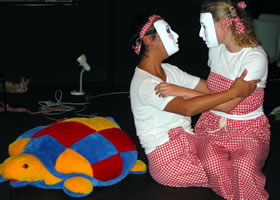Combinations of Disciplines

What combination of ‘disciplines’ can you expect from your Drama Studies at ACU?
When you study Drama at ACU, you will have the opportunity to explore the different kinds of knowledge developed in all of these different disciplines. Each of these disciplines utilises a number of different analytical tools or methods to study different objects associated with dramatic, theatrical and other kinds of cultural ‘performances’. As you learn to use different analytical tools and to identify the different objects that can be studied, you will be learning how to assess, highlight and utilise activities and texts associated with drama, theatre and performance.
The term ‘drama’ has traditionally been used to refer to the study of literature that can be acted for audiences. Since this area of study remains a clear focus in a school of ‘drama’, you can expect to gain knowledge of forms of dramatic literature that have been written and performed throughout various stages of history. However, your studies will not be confined to the analysis of literary texts and you will be introduced to knowledge and skills associated with the interpretation and production of historical and contemporary forms of theatrical performance. While these kinds of performances can be devised in theatres, they are not limited to spaces that have been built specifically for dramatic performances. Part of this study will also involve learning how to safely experiment with different performance spaces, ideas, styles and techniques so that you can create dynamic work without causing harm to yourself or others.
While you will learn how to identify, create and analyse many different styles and forms of performance, the performances you study and develop may or may not be associated with literary or even theatrical forms. As there are many theoretical tools and practical techniques now available for drama students, you will be introduced to a range of material and encouraged to explore what is available. However, you will always be encouraged to use your own creativity to experiment with what is possible for you and for the texts and forms of performance you study and develop.
References:
Brockett, Oscar. The Essential Theatre. 7th ed. Fort Worth, TX: Harcourt Brace, 2000.
Kennedy, Dennis, ed. Oxford Encyclopedia of Theatre and Performance. Oxford: Oxford UP, 2003.
Schneider, Rebecca. The Explicit Body in Performance. New York; London: Routledge, 1997.
For general questions about theatre subjects have a look at the following website:

